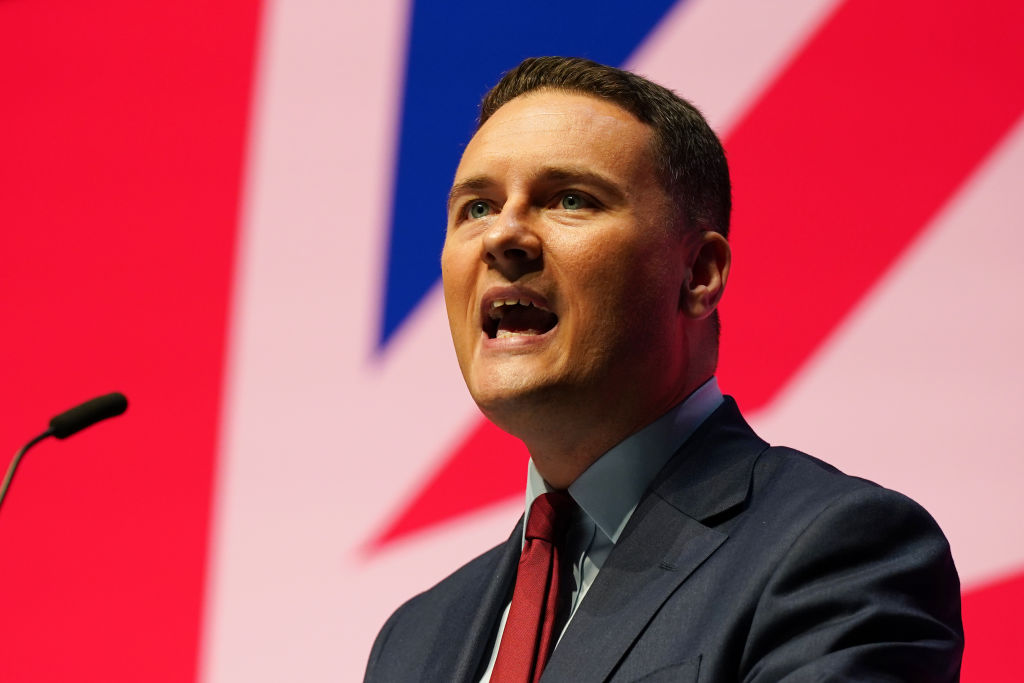The last day of Labour conference can be a bit of a graveyard slot, given the leader’s speech has already happened. Not so this morning, which contained the two public services that the the party is keenest to talk about: education and the NHS.
The NHS has long been a comfort blanket for the party that founded it but often lacks the volition to reform it. Anyone hoping for a cosy, snuggly we-love-the-NHS speech today will have been jolted awake by Wes Streeting, who built on his theme that the health service is ‘no longer the envy of the world’ and is in an ‘existential’ crisis.
He tried to reassure delegates that the reason he was making these arguments was because he cared about the NHS:
Labour will never abandon the founding principles of the NHS as a publicly funded public service, free at the point of use. I make the case for reform not in opposition to those principles but in defence of them. I’m blunt about the fact that the NHS is no longer the envy of the world, not to undermine it, but to reassure people that we’ve noticed. I argue that our NHS must modernise or die, not as a threat but a choice.
His critique of the service (one Spectator readers will recognise from the interview he did with the magazine last year) was that ‘we have an NHS that gets to people too late, a hospital-based system geared towards late diagnosis and treatment, delivering poorer outcomes at greater cost. An analogue system in a digital age. A sickness service, not a health service’. He illustrated this point before his speech had even begun: he was introduced by a man who bluntly told the stage that within five years, he wouldn’t be here, because his terminal bowel cancer meant he would be dead. The NHS had taken too long to get to him, he said.
Streeting’s prescription is to make primary care the ‘heart of Labour’s plan for the NHS’ and move the focus ‘from hospital to community’. This is not an easy thing to implement, even though GP shortages and the pressures on appointments mean voters are well aware of the need to better-fund primary care. At a Nuffield Trust panel earlier this week, I asked Streeting’s junior colleague Karin Smyth whether her party could really plough ahead with some of the logical implications of changing the focus from hospital to community. Given Rachel Reeves has made abundantly, scarily, clear this week that her shadow cabinet colleagues can’t expect much in the way of extra spending, it won’t be the case that Labour can allocate more money to primary and community services while also funding acute care at its current level.
Proper preventive, community medicine should in time lead to the pressures on hospital care falling, but even when that is the case, the public get very anxious about a local hospital closing, and MPs tend to campaign for local units to remain open even if they are entirely surplus to requirements or indeed manifestly unsafe. Smyth, herself a former NHS manager from Bristol, argued that she had overseen successful closures of a local hospital with the local community on board. She was referring to Frenchay Hospital in North Bristol. Still, if Labour is really up for that fight, then it will eclipse Keir Starmer’s promise to ‘bulldoze’ the planning system and overrule any of his own MPs who object.
Streeting’s language about ‘existential crisis’ and the need for reform makes clear that he has been talking and listening a lot to his Labour predecessors in the health brief, particularly Alan Milburn and Alan Johnson. Having interviewed both of them for my book on the history of the NHS, I recognise certain turns of phrase and attitudes. But the difference between Streeting’s situation and the reforms that Milburn and Johnson were pursuing was that they were operating in a time when the spending taps were wide (perhaps too wide) open for the NHS. Admittedly, they had opened largely because Tony Blair bounced his Chancellor into doing so, ambushing Gordon Brown by announcing spending rises on the Breakfast with Frost programme without first warning him. But the way Milburn and his colleagues got the health world signed up to these changes was by saying they’d give the health service the money it needed alongside them. Streeting is going to have to be far more creative, and in a time of intense industrial strife in the service, too.







Comments